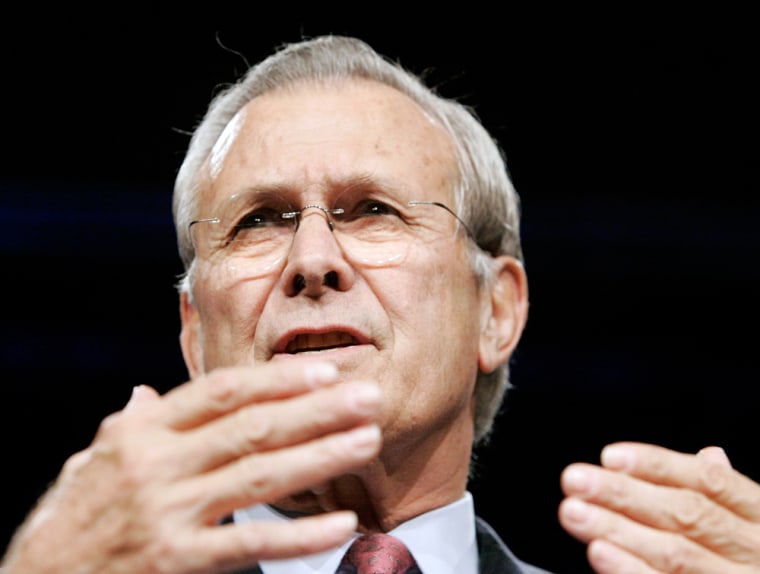In an emotional farewell, Defense Secretary Donald Rumsfeld said Friday the single worst day of his nearly six years as secretary of defense occurred when he learned of the Abu Ghraib prisoner abuse in Iraq.
Speaking to a gathering of Defense Department employees 10 days before he is scheduled to leave office, Rumsfeld defended his record on Iraq and Afghanistan and warned of "dire consequences were we to fail" in Iraq.
He also said he might write a book about his tenure at the Pentagon and he predicted that his successor, Robert Gates, would do a good job. He declined to say what advice he had offered Gates, who was confirmed by the Senate this week.
Rumsfeld choked up briefly while recalling a woman in Alaska giving him a bracelet last August as a reminder of the sacrifices by soldiers of the Army's 172nd Stryker Brigade, whose year-long tour in Iraq was extended by four months to help try to quell sectarian violence in Baghdad. Showing it still on his wrist, Rumsfeld recalled that he told the woman he would wear the green bracelet until the 172nd came home to Alaska.
He spoke at length about his concern that the United States not let Iraq and Afghanistan collapse.
‘Staying power’ in Iraq, Afghanistan
"We have every chance in the world of succeeding in both those countries, but only if we have the patience and only if we have the staying power," he said. Asked about the bipartisan Iraq Study Group's recommendations for a change in approach to the Iraq war, Rumsfeld said none of the suggestions were new.
"I can't think of a thing that anyone's thought of that General (Peter) Pace and General (John) Abizaid and those folks have not been working on and analyzing and studying and adjusting to over time," he said, referring to the top two generals overseeing the Iraq war. He said the Pentagon had sent its advice to the White House on possible new approaches.
In a question-and-answer session, he was asked what was his best day and his worst day.
"Clearly, the worst day was Abu Ghraib, seeing what went on there and feeling so deeply sorry that that happened," he said without hesitation, referring to the scandal in the spring of 2004 that triggered worldwide condemnation and prompted him to twice offer his resignation to President George W. Bush at that time. Bush rejected those offers.
"I guess my best day, I don't know, may be a week from Monday," he said with a big grin, referring to the fact that his successor, Robert Gates, is scheduled to take over at the Pentagon on Dec. 18.
In prepared remarks to his audience, Rumsfeld predicted that the period since he took office in January 2001 would eventually be seen as one of "enormous challenge and historic consequence."
Asked how he wants history to remember him, he said simply, "Better than the local press."
With a couple of dozen troops from each military service and a few civilian Pentagon employees seated behind him on stage in the Pentagon's main auditorium, Rumsfeld spoke to an audience of several hundred people. With a big smile, he strode into the room to a cascade of applause and a few approving yelps.
"I suspect this will be among my last public remarks as secretary of defense," he said. His last full day will be Dec. 17.
It was one of the few public appearances Rumsfeld has made since Bush announced on Nov. 8 at the White House that he was replacing Rumsfeld with Gates to get a "fresh perspective" on the Iraq war. Gates won confirmation by the Senate this week.
‘A time of enormous challenge’
Rumsfeld applauded the work and dedication of Pentagon employees and said he was proud to have been associated with them.
"Each of you and future generations of Americans, as well as future generations of Iraqis and Afghans, will be able to look on these past years as a time of enormous challenge and historic consequence," he said.
"As I leave at the end of my second — and, good Lord willing, my last — (term) I do leave believing as I did 30 years ago that America is a truly great nation, that the American people are wise and decent," he said.
He was introduced on the stage by Pace, chairman of the Joint Chiefs of Staff, who lauded Rumsfeld as a man of courage, integrity and vision.
"This man's work ethic is incredible," Pace said. "Is he demanding? You bet." Rumsfeld then interrupted, saying with a laugh, "No! I've been on my best behavior."
Rumsfeld, 74, is one of the longest-serving defense secretaries in U.S. history and is the only person to have held the position twice. His first stint was from November 1975 to January 1977, when he held the distinction of being the youngest defense secretary in history.
